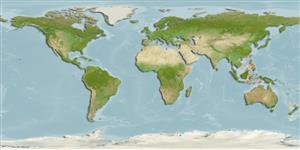Holocephali (chimaeras) >
Chimaeriformes (Chimaeras) >
Chimaeridae (Shortnose chimaeras or ratfishes)
Etymology: Hydrolagus: hydro-, combining form of hydor (Gr.), water; lagos (Gr.), hare, i.e., “water rabbit,” probably referring to three pairs of tooth plates, which tend to protrude from the mouth like a rabbit’s incisors. (See ETYFish); deani: In honor of American ichthyologist Bashford Dean (1867‒1928), for his “able studies” of chimaeras. (See ETYFish).
More on authors: Smith & Radcliffe.
Environment: milieu / climate zone / depth range / distribution range
Ecology
Marine; bathydemersal; depth range 469 - 770 m (Ref. 9904). Deep-water
Western Central Pacific: known only from the Philippines.
Size / Weight / Age
Maturity: Lm ? range ? - ? cm
Max length : 67.0 cm TL male/unsexed; (Ref. 9904); 73.0 cm TL (female)
Rare and limited to the upper slope. Oviparous (Ref. 205). Eggs are encased in horny shells (Ref. 205). Biology and utilization unknown in the area (Ref. 9904).
Life cycle and mating behavior
Maturities | Reproduction | Spawnings | Egg(s) | Fecundities | Larvae
Smith, H.M., 1912. The chimaeroid fishes of the Philippine Islands with description of a new species. Proc. U.S. Natl. Mus. 42(1899):231-232. (Ref. 5283)
IUCN Red List Status (Ref. 130435)
Threat to humans
Harmless
Human uses
Fisheries: of no interest
Tools
Special reports
Download XML
Internet sources
Estimates based on models
Preferred temperature (Ref.
123201): 6.2 - 9.8, mean 7.5 °C (based on 119 cells).
Phylogenetic diversity index (Ref.
82804): PD
50 = 0.5000 [Uniqueness, from 0.5 = low to 2.0 = high].
Bayesian length-weight: a=0.00282 (0.00118 - 0.00673), b=3.10 (2.89 - 3.31), in cm total length, based on LWR estimates for this (Sub)family-body shape (Ref.
93245).
Trophic level (Ref.
69278): 3.8 ±0.6 se; based on size and trophs of closest relatives
Resilience (Ref.
120179): Low, minimum population doubling time 4.5 - 14 years (Assuming Fec <100).
Fishing Vulnerability (Ref.
59153): Moderate to high vulnerability (49 of 100).
